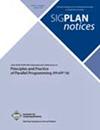编译而不继续
Q1 Computer Science
引用次数: 0
摘要
编译器中的许多研究领域都产生了连接点的概念,即不同执行路径汇集在一起的地方。连接点通常被视为函数或连续,但我们。。。本文章由计算机程序翻译,如有差异,请以英文原文为准。
Compiling without continuations
Many fields of study in compilers give rise to the concept of a join point—a place where different execution paths come together. Join points are often treated as functions or continuations, but we...
求助全文
通过发布文献求助,成功后即可免费获取论文全文。
去求助
来源期刊

ACM Sigplan Notices
工程技术-计算机:软件工程
CiteScore
4.90
自引率
0.00%
发文量
0
审稿时长
2-4 weeks
期刊介绍:
The ACM Special Interest Group on Programming Languages explores programming language concepts and tools, focusing on design, implementation, practice, and theory. Its members are programming language developers, educators, implementers, researchers, theoreticians, and users. SIGPLAN sponsors several major annual conferences, including the Symposium on Principles of Programming Languages (POPL), the Symposium on Principles and Practice of Parallel Programming (PPoPP), the Conference on Programming Language Design and Implementation (PLDI), the International Conference on Functional Programming (ICFP), the International Conference on Object-Oriented Programming, Systems, Languages, and Applications (OOPSLA), as well as more than a dozen other events of either smaller size or in-cooperation with other SIGs. The monthly "ACM SIGPLAN Notices" publishes proceedings of selected sponsored events and an annual report on SIGPLAN activities. Members receive discounts on conference registrations and free access to ACM SIGPLAN publications in the ACM Digital Library. SIGPLAN recognizes significant research and service contributions of individuals with a variety of awards, supports current members through the Professional Activities Committee, and encourages future programming language enthusiasts with frequent Programming Languages Mentoring Workshops (PLMW).
 求助内容:
求助内容: 应助结果提醒方式:
应助结果提醒方式:


